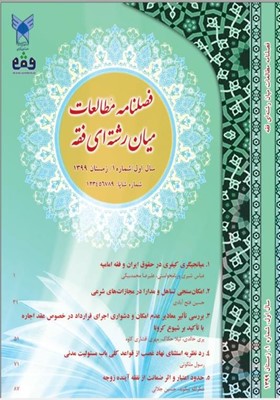میانجیگری کیفری در حقوق ایران و فقه امامیه
محورهای موضوعی : فصلنامه مطالعات میان رشته ای فقهعباس شیری 1 * , علیرضا محمدبیکی 2
1 - دانشیارگروه حقوق کیفری و جرم شناسی ، دانشکده حقوق و علوم سیاسی، دانشگاه تهران، تهران، ایران. (نویسنده مسئول )ashiri@ut.ac.ir
2 - عضو هیأت علمی، گروه فقه و حقوق اسلامی ، دانشکده ادبیات و علوم انسانی ، واحد تهران مرکزی دانشگاه آزاد اسلامی ، تهران، ایران.a.khortab@gmail.com
کلید واژه: میانجیگری, حل و فصل اختلافات, قضازدایی, عدالت توافقى,
چکیده مقاله :
میانجیگری کیفری در حقوق ایران و فقه امامیهچکیدهاز زمان شکل گیری دادگستری عمومی، دولت به عنوان نهاد پاسخگوی رفتارهای مجرمانه از سیاستهای رسمی اقتدارگرا بهره گرفته است.اما این شیوه با شکل گیرى اندیشه جامعه مدنى و تاثیر آن در حقوق کیفرى و جرم شناختى، با انتقادهای پست مدرن فلسفی در پرهزینه بودن و اثر بخشى مواجه شده است. در این میان، نگاه واقع گرایانه مدیریتی و اقتصادی منجر به بازگشت به راهکارهای غیر رسمی حل و فصل اختلافات با عدول از نقش حاکمیتی دولتها و برون سپاری برخی از وظایف و اختیارات شد که نقطه اشتراک همه آنها قضازدایی است. رویکرد اتخاذی قانون آیین دادرسی کیفری مصوب ۱۳۹۲ را می توان آغازی بر ساختارمندی آن در حقوق کیفری ایران دانست که علاوه بر مبانی عرفی حقوقی، بر مبانی فقهی نیز استوار است.پژوهش حاضر راهکارهای غیر رسمی قانون به ویژه میانجیگری کیفری را به عنوان شیوه ای شناخته شده و پرکاربرد تحلیل و نقاط ضعف آن را با ارائه توجیهات یا مبانی منطقی پوشش داده است. نتایج تحلیل نشان می دهد با وجود کاربست این راهکارها در خصوص جرایم خرد (جرایم درجه ۶ ، ۷ و ۸) شکاف عمیقی تا حصول عدالت توافقی وجود دارد. با این حال مصادیق اصلاحات قانونى، نشان از سیاست گذاری در راستای توافقی شدن دادرسی و پذیرش مبانی و منطق راهکارهای غیر رسمی برای حل و فصل دعاوی کیفری دارد که این می تواند فتح بابی برای تسری سازوکارهای قضازدایانه درباره جرایم درجات شدیدتر یا جرایم غیرتعزیری باشد.واژگان کلیدی: قضازدایی، میانجیگری، حل و فصل اختلافات،عدالت توافقى.
Criminal Mediation in Iranian Law and Imamiyah JurisprudenceAbstractSince the formation of the public justice, the government as the institution responsive to the criminal acts has used formal authoritarian policies. But by the formation of civil society and its effects on criminal law and criminology, this approach has faced with philosophical post-modern criticisms regarding its costs and effectiveness. Meanwhile, realistic managing and economic attitude has resulted in returning to the informal solutions for the disputes while ignoring governing role of the governments and outsourcing some of the duties and authorities all of which characterized by dejudicialization.Adopted approach by the Code of Criminal Procedure 2014 can be considered as the starting point for it to be structured in Iranian criminal law which aside from legal common basics it has also jurisprudential bases.The present research analyzes informal solutions - criminal mediation, in particular - of law as a known and frequently used method and covers its weak points by providing justifications or logical basics. The results of the analyses showed that despite the application of these solutions regarding minor offences (offences of 6, 7, 8 degrees) there is a deep gap to consensual justice to be realized. Nevertheless, the examples of legal reforms are as the indications of policy making for the consensualization of legal procedure and recognition of the basics and logic of informal solutions for solving criminal disputes which can be a starting point for extending the mechanisms of dejudicialization to the offences of higher degrees or non-criminal offences.Key words: dejudicialization, mediation, solving disputes, consensual justice
_||_

